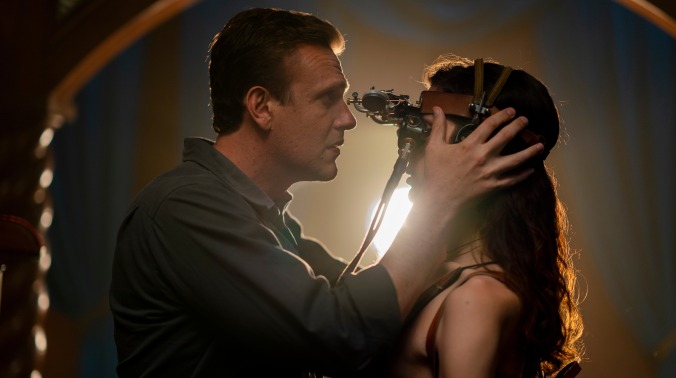Most of us, even those without mind-numbingly boring existences, have pondered the “Is that all there is?” existence question. It’s what leads to cinematic reality explorations like Inception and The Matrix. A bit less intense than Neo’s journey, but just as confusing, is Jason Segel’s new series Dispatches From Elsewhere, based on the alternate reality game Games Of Nonchalance, which ran in San Francisco from 2008 to 2011. As the promo poster puts it, “This show is for you if you believe there must be more.”
Here the setting switches to Philadelphia, where our gateway character is Segel’s Peter, a sad sack who eats the same bodega sushi every night (unless he daringly swaps it out for a burrito) and works at a soul-sucking job computing algorithms for a Spotify-like service. Peter spies a flyer that draws him into some strange sort of adventurous game run by the Jejune Institute, and hooks up with teammates Simone (Eve Lindley), Janice (Sally Field), and Fredwynn (André Benjamin). At the heart of it all is Richard E. Grant’s calculating Octavio, appropriately menacing and charming as the head of the enigmatic institute. But there’s also an anti-Jejune counter-movement called the Elsewhere Society, led by the mysterious Commander 14. Or is the counter-movement in on the whole thing? Is this a game or not? Even if it is, is it a force for good or evil?
Segel is also the creator-executive producer of the series, and the writer-director of the first episode. Those familiar with his oeuvre may spot common elements in the absurdity: The character name of Peter, for example, which is also the name of Segel’s despondent lead in Forgetting Sarah Marshall. There are frequent nods to Law & Order: SVU, which Segel says he watches every night before bed. Even his How I Met Your Mother’s character’s favorite fictional beast, Bigfoot, plays a part in the mysterious game (though, to be fair, apparently a Bigfoot version also showed up in the San Fran original).
Dispatches From Elsewhere is based in part on Spencer McCall’s 2011 documentary, The Institute, which chronicled the Games Of Nonchalance, produced by Oakland artist Jeff Hull. The original game’s Jejune Institute, a flyer ad for the human forcefield experiment, and even a quote from a participant on how the game made the real world feel so much more exciting all show up in Dispatches From Elsewhere. The convoluted game/show remains tremendously difficult to explain, however: “I still don’t understand what’s happening,” the monotoned Peter expresses in an early episode. There’s a thin line between “engagingly mysterious” and “indecipherable,” and Dispatches From Elsewhere vigorously skirts both sides.
The real draw is the same element that drew thousands of people to the Games Of Nonchalance in the first place (and made the saga of Neo so compelling). The thought that this reality isn’t all there is, that we were meant for more than this, that we’re special. That’s Peter’s gateway into the Jejune Institute, but fortunately, the series doesn’t stop there, instead wisely hooking him up with three engaging teammates. The transition journey of Eve Lindley’s effervescent Simone is summed up in her intro, as she works to re-engage with the world. André Benjamin (a.k.a. André 3000) is the meticulously detailed conspiracy theorist Fredwynn, determined to bust the entire game wide open. Best of all is Sally Field; for her character, Janice, the game helps to alleviate her greatest fear: being alone.
Does Dispatches From Elsewhere arouse enough interest to keep us as hooked as the game’s players are? After four full episodes (each featuring one of our main team members), it’s still unclear what Octavio’s goal is and whether the game is real or not. Some supernatural-ish elements are difficult to explain away. Although some engaging animated segments help illustrate some of the series’ more complex elements, other scenes, like Peter being drawn into a group dance in the rain led by Bigfoot, veer dangerously close to just being weird for weirdness’ sake. If the game is in fact a “high-level social experiment,” as Simone surmises halfway through the season, it would be helpful to know what the stakes are—if, in fact, there are any. Especially since, as Simone succinctly points out, “There’s an undercurrent of creepy that I can’t quite put my finger on.”
Thanks to the skill and charisma of these players, Dispatches’ human moments resonate even in the midst of a murky swamp of absurdity. At this point, we should all just be happy enough to see Field do anything on the small screen: Her Janice is an absolute spitfire who pulls off moves the younger members of her team are too timid to try. Fredwynn’s starkness is intriguing, as is the burgeoning romance between Peter and Simone. That these four manage to deliver valuable and often abstract life lessons through Dispatches’ labyrinthian setup is a testament to the game as a metaphor, but also displays the superlative skills inherent in the writing and the performances.
In a cultural landscape still cluttered with too many domestic sitcoms and medical procedurals, Dispatches’ imaginative paths take us places and inspire questions we’re unlikely to reach as a passive TV watcher. What would we say if we thought we could say anything? How much of the memories we frequently turn to are accurate? And if this is our only reality, what can we change about ourselves to get it closer to what we really want? Dispatches’ alternate take on reality not only offers a break from our own day-to-day world—it can also bring some new perspective with it.

 Keep scrolling for more great stories.
Keep scrolling for more great stories.
